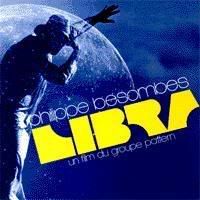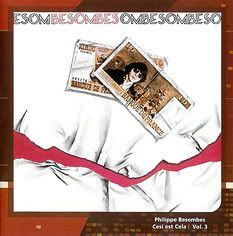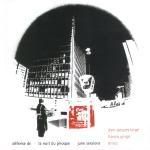
Pôle, 1974; reissued by MIO with bonus material; out of print, but the CD is fairly easy to find
MIO version: 21 tracks, 75:44

Divox, 1979; reissued by MIO with bonus material; out of print, but the CD is fairly easy to find
MIO version: 10 tracks (11 technically; see review), 79:09 (with hidden track)
Ahhhh, more Pôle-related goodies! As reviewed in a previous post, Philippe Besombes was featured on the astonishing PÔLE album by Besombes-Rizet. LIBRA was another Besombes release on Pôle Records, and while it too is electronic-rock oriented, it's quite a different beast! Originally a soundtrack for a highly experimental film without any other sound (!), LIBRA originally consisted of seventeen tracks, ranging from just under two minutes to barely over six in length. Four of the tracks were written by Besombes' other musicians, and these all stick out. As part of the whole, they're not bad, but the slightly goofy "Tis A Song" and "Boogimmick" really don't add much; "Hache 06" and "Ballade en Velo" are much better additions. Oh, but the Besombes material proper! Everything from primitive synths and organs to sitar and electric guitar shows up in these miniature masterpieces. "La Plage" opens the album and introduces a recurring synth theme (this IS a soundtrackk, remember), surrounded by odd female vocals. "Raggacountry" is a startling synth-and-sitar duet, while "Ceremonie" relies on heavy organ for an unearthly atmosphere. The album alone is a true work of art, but the bonus tracks are very tasty indeed. "Chocolate Cream" and "Tamota Pie Pie" would fit in perfectly with LIBRA proper, "Orgue Hache 06" is seventeen seconds of a single organ chord, and "Piano Prepare" is an absolutely stunning twenty-three minute piece (performed on, you guessed it, a prepared piano!). If Besombes had only recorded this, his legacy would be assured; this is even better than PÔLE!
After recording the Besombes-Rizet album, Besombes got involved with writing pieces for ballet companies (an album of library music was recorded in there as well). In 1979, he released a couple of these as CECI EST CELA ("this is that" in English) on the Divox label. Originally intended to be self-titled (the album art backs this up, and MIO previously advertised this reissue as ESOMBESOMBES!), four of its five tracks are VERY experimental pieces that foreshadow the early industrial scene while simultaneously updating and refining classic electronic techniques. Synths drone and squeal and provide all manner of sounds, accompanied by musique concrete and distorted conversations and monologues. None are as whimsical as LIBRA or PÔLE, but they do show Besombes' by-now signature sound at its peak. Track one, however, is a strange (and rather out of place) comedic disco tune entitled "Princesse Lolita", which was included at Divox's unrealistic request for a hit single. A dialogue between a helium-voiced princess and a distorted dragon, it's a fun song, but it's also very conspicuous in its dissimilarity from the surrounding material. No wonder Besombes allowed MIO to place this track in the negative space before track one! This means you have to search backwards from track one to find it; most listeners will probably never listen to it again after one go (I've only listened to it twice). The bonus material on CESI EST CELA (yes, the reissue is deliberately misspelled; why is beyond me) is divided by year. There are two tracks each from 1972, 1975, and 1976. The '72 material was recorded as a duo with Jean-Francois Dessoliers (the duo was appropriately called PJF), while the latter bonus material shows the evolution from LIBRA to PÔLE to CECI EST CELA. This is definitely Besombes at his most serious and academic, but it's still eons ahead of most contemporaries and a fascinating collection from start to finish.
Anything Besombes-oriented is a must-buy, but the recent closing of MIO can potentially hinder that. As of this writing, Wayside Music (see link on this page) is offerring all three MIO Besombes releases for six dollars each (update: CESI EST CELA is now $16, which probably means the stock is running low, so you should still get it while you can). The mastering is perfect, and the bonus material is worth the purchase alone! Get them now so you don't regret it later!
P.S. While much harder to find, his library music LP LA GUERRE DES ANIMAUX is equally amazing, as are his contributions to the CITY AND INDUSTRY LP.

